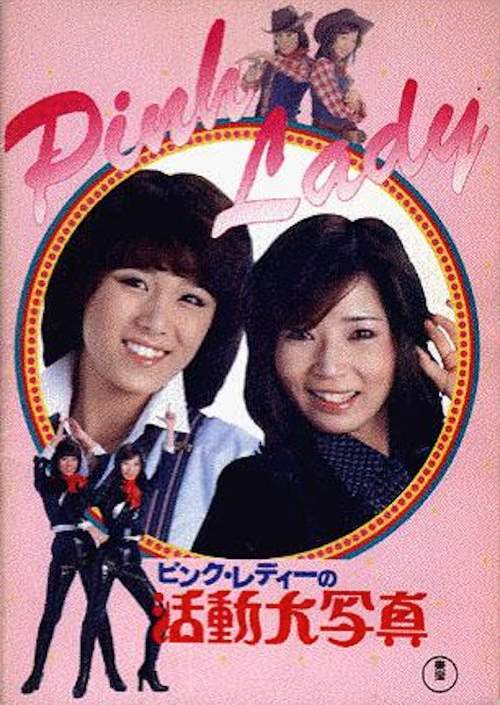 Pink Lady was the Japanese forerunner to the Spice Girls: a short-lived but enormously popular pop duo who were a bit short on talent and charisma but quite high on bubble gum sex appeal. Mei and Kei, a.k.a. Mitsuyo Nemoto and Keiko Masuda, thrived in their native country during the years 1976-79 (amassing a fortune that’s said to be in excess of $100 million), meaning a Pink Lady movie was inevitable.
Pink Lady was the Japanese forerunner to the Spice Girls: a short-lived but enormously popular pop duo who were a bit short on talent and charisma but quite high on bubble gum sex appeal. Mei and Kei, a.k.a. Mitsuyo Nemoto and Keiko Masuda, thrived in their native country during the years 1976-79 (amassing a fortune that’s said to be in excess of $100 million), meaning a Pink Lady movie was inevitable.
That film took the form of the Toho sanctioned PINK LADY’S MOTION PICTURE (Pink Lady no Katsudō Daishashin) in 1978, which consciously emulated the breezy stream-of-consciousness aesthetic of A HARD DAYS’ NIGHT (1964), and can also be viewed as a forerunner to SPICE WORLD. The gals later tried to crack the lucrative American market with the short lived NBC variety program PINK LADY AND JEFF (1980), which hastened their inevitable demise.
PINK LADY’S MOTION PICTURE begins in New York City (suggesting the film’s target audience wasn’t Japanese), where Mei and Kei are touring. They’re unaware that back in Tokyo the sleazy producer Senkichi (Tetsuo Ishidate) is contemplating a movie about them, even though he admittedly doesn’t understand their appeal. He brainstorms ideas with Shinpei (Kunie Tanaka), a director, and Hiroshi (Taisaku Akino), a screenwriter, leading to three mini-films starring Mei and Kei.
Hiroshi is in favor of a weepy romance, which takes the form of the first, and most interminable, of the mini-films. It features Mei and Kei as sisters who discover they’ve been dating the same man (Ken Tanaka) in a dreary slog that would have worked better as a comedy.

Senkichi provides the idea for the second narrative. It’s a science fiction satire in which the ladies assume the guises of circus performers trying to protect Mon-chan, an alien being that looks like a giant stuffed animal. Their efforts lead to a car chase and an eventual rendezvous with a flying saucer, which whisks Mon-chan and the ladies into outer space. Mei and Kei beg their alien overseers to return them to Earth, and their wish is granted, but a mishap results in the gals being rendered invisible—and concludes the segment with a music video in which the ladies use their new guises to fight crime.
Shinpei dreams up the final story, which takes place in a Wild West setting. Here Mei and Kei are entertainers who become involved with a rogue cowboy named Sugar Brown (Fujita Okamoto), who riles up law enforcement officers and an outlaw gang. The narrative is interrupted by the increasingly befuddled producer Senkichi and screenwriter Hiroshi, who can’t make up their minds about how the story should conclude (with the idea of a variety show of the type that in real life would take down Pink Lady brought up).
Senkichi ultimately calls Kei and Mei in New York and runs through the three story ideas, with the ladies deciding they want to film all three…hence this movie.
My verdict: the first of the film’s three segments is shrill and melodramatic, intending to show off the ladies’ dramatic skills when there’s clearly not much worth showing. Part two is filled with tiresome slapstick and lackluster action sequences, although it at least doesn’t call upon Mei or Kei to perform any acting feats, concentrating instead on the ladies’ physical assets, displayed in ultra-skimpy circus outfits. Part three is the most interesting, incorporating elements from its predecessors into a postmodern swirl, with the producer and screenwriter of the wraparound segment directly interacting with the characters, and the UFO of part two making a cameo appearance.
The film overall is colorful and energetic, but bears the marks of a hasty and ill thought-out production. It is of course punctuated with Pink Lady stage performances, covering abbreviated versions of all their hit singles, so fans of Mei and Kei will likely be satisfied. Everyone else, however, is advised to turn their attention elsewhere.
Vital Statistics
PINK LADY’S MOTION PICTURE (Pink Lady no Katsudō Daishashin)
Toho
Director: Tsugunobu Kotani
Producers: Kazuhiko Sōma, Junichi Tanaka
Screenplay: James Miki
Cinematography: Yūzō Inagaki
Editing: Yoshitami Kuroiwa
Cast: Mitsuyo Nemoto, Keiko Masuda, Tetsuo Ishidate, Kunie Tanaka, Taisaku Akino, Ken Tanaka, Masumi Harukawa, Osami Nabe, Iwao Dan, Bill Ross, Gajirō Satō, Kibaji Tankobo, Hachirō Misumi, Masao Komatsu, Fujita Okamoto, Hiroshi Tanaka, Toby Kadoguchi
